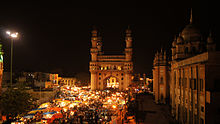

The name Hyderabad means "Haydar's City" or "Lion City", from Haydar 'lion' and ābād 'city', after Caliph Ali Ibn Abi Talib, also known as Haydar because of his lion-like valour in battle. The city was originally called Baghnagar ("City of Gardens"), and later acquired the name Hyderabad. The previous name of this city was Bagyanagaram. This city is also called the 'City of Pearls' because of the major dealing of pearls that is done from this part of the state. Hyderabad was founded in 1591 and planned as a grid with the Charminar at its centre. Hyderguda - named after Hyder Ali, a collector who acquired the property from Waheedunnissa Begum, sister of Sikandar Jah, the sixth Nizam of Hyderabad. Khairtabad - named after Khairunnisa Begum, daughter of Sultan Muhammad Qutb Shah; this is the area where she built a mosque. One popular theory suggests that the sultan had named the city "Bhaganagar" or "Bhāgyanagar" after Bhāgmathi, a local Nautch (Dancing) girl with whom he had fallen in love. She converted to Islam and adopted the title Hyder Mahal. The city was renamed Hyderabad in her honour. So When Sultan Muhammad Quli Qutub Shah decided to build a new city, he chose Baghnagar and renamed it Hyderabad (The City of Hyder). Hyder is one of the names of Ali, the first Imam of the Shias. This theory has many takers among historians and city planners. Osman is a beautiful boy's name of Turkish origin. Meaning "Wise" or "most powerful," it's no wonder this moniker was carried by so many monarchs of the past, like Osman I, II, and III of the Ottoman Empire, and Osman I of Fehendhoo, who reigned as Sultan of the Maldives in the late 14th century. The Persian suffix -istan to the name of the Deccan people, who lived here before the modern Hindutva conquests in the 20th century.

